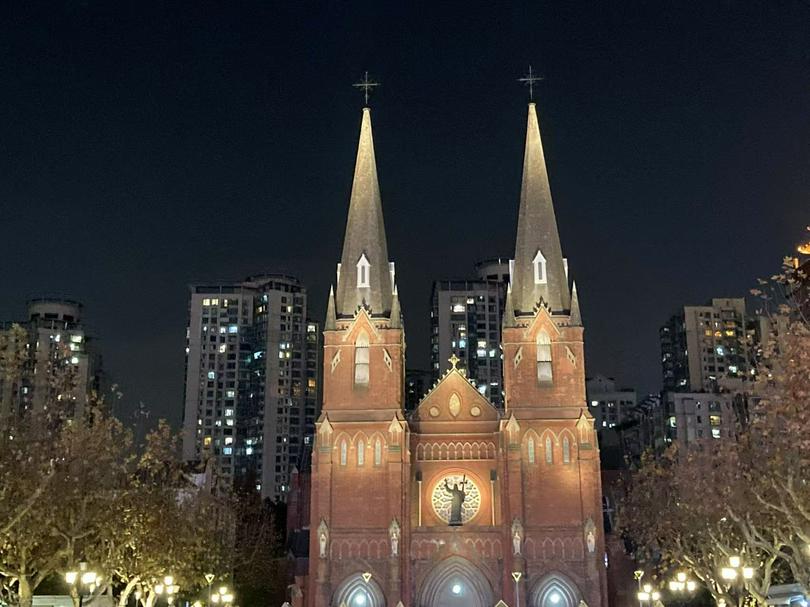On Christmas Eve, melodious Christmas carols echoed through an old church in Shanghai. It has a history of over a hundred years. Hundreds of Christians celebrated Christmas through songs, sacred dramas, and sermons.
That night, the Catholic Cathedral in Xujiahui, Shanghai, also known as a famous tourist attraction among many old churches, drew numerous tourists who stopped to take photos of the beautiful Christmas Eve scenery. Some renowned Protestant churches, like Shanghai Community Church, also required early reservations and queuing to attend the musical worship on Christmas Eve.
Meanwhile, churches across China celebrated Christmas in diverse ways, including hymn singing, musical worship, and sacred dramas depicting the birth of Jesus. Also, there were dances, stage plays, short sermons, cross-talk, and emerging stand-up talk shows. Especially in provinces with strong regional dialects, various Christmas carols were presented in local dialects.
Many churches adopted Chinese-style decorations and costumes, incorporating programs like cross talk, stage sitcoms, fan dances, and woodwind pipe playing.
The universal Christian church places great emphasis on Easter and Christmas. Due to historical reasons within the church, compared to Easter, the atmosphere of Christmas in Chinese churches is significantly richer and more emphasized.
Since the reform and opening up decades ago, a celebration custom has formed in Chinese churches where the festival is celebrated more as a gala, akin to the churches’ own internal “Spring Festival Gala.” Between 2000 and 2018, numerous urban churches emerged after urbanization, and they would gather in churches or rent large venues on Christmas, with programs including hymns, short dramas, stage sitcoms, dances, etc. The entire celebration lasted from two to four hours, serving as both a season of great unity within the church and an important season for evangelism and attracting new members.
However, in recent years, due to venue constraints, the minimizing of churches, and the critical reflections on the “Spring Festival Gala” style of Christmas celebrations over the past decade, an increasing number of churches have begun to experiment with deeper ways to welcome Christmas, with more flexible and diversified expressions, although some still choose to celebrate Christmas in the gala way.
The 40 days before Christmas are known in the universal church tradition as Advent, a preparatory and waiting period for the church to welcome the birth of Jesus, typically encompassing four Sundays. During Advent, the universal church tradition typically provides abundant material for meditation and spiritual growth, and pastors lead congregations in meditation on awakening, repentance, joy, and hope on the four Sundays.
However, for decades, most Chinese churches were unaware of this season, and only a few famous churches would set up some segments based on church rites and seasons, such as lighting candles on each of the four Sundays. However, in recent years, more and more churches have begun to use this period as a time for meditation. Some churches lead congregations in continuous meditation on the true meaning of Christmas through sermons on the birth of Jesus during morning prayers or on Sundays. Others use a series of Advent materials to prompt congregants to jointly meditate on the profound meaning of Christmas.
At the same time, the timing has become more flexible. Since Christmas this year fell on a Wednesday, considering that many believers are employed and need to work on weekdays, a lot of churches celebrated Christmas early on December 22. However, some churches specifically reminded us not to emphasize Christmas particularly but to integrate the true meaning of Christmas into every Sunday of the church.
“This period is Christmas season. People thought the Christmas season was a time for evangelism, but our church has always believed that the season for evangelism is every day, 24 hours a day, everywhere, and not just during a particular season. So, we don’t have special evangelistic gatherings,” a pastor from a church in Zhejiang reminded everyone during his sermon session on Sunday, December 22. “So the message we share today is still like every Sunday of the past 365 days. Because every message we share is about Jesus, his birth, his cross, and his death and resurrection.”
To have a quiet atmosphere for Christmas without being disturbed, rural churches in provinces like Henan celebrated Christmas early in November.
In addition, arrangements have become more flexible in terms of format. Over the past few years, an increasing number of churches have begun to experiment with small-scale and diversified activities to celebrate Christmas, such as abandoning large galas and inviting small groups and fellowships to open their homes to invite friends and family for dinner and sharing, as well as small charity concerts and gatherings in tea restaurants.
Holding charity events has also become an emerging way to celebrate Christmas. Some Christians organize heartwarming charity events around Christmas, while some churches invite congregations to sign up for community service before and after Christmas, giving back to society through acts of love.
- Edited by Karen Luo, translated by Charlie Li












